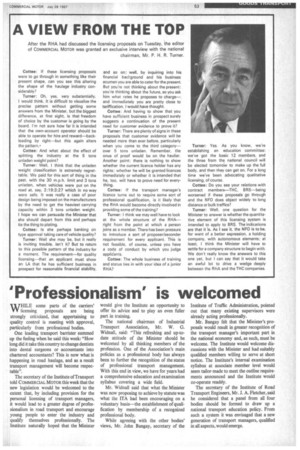'Professionalism' is welcomed
Page 55

If you've noticed an error in this article please click here to report it so we can fix it.
WHILE some parts of the carriers' licensing proposals are being strongly criticized, that appertaining to quality control is meeting with approval, particularly from professional bodies.
One leading transport barrister summed up the feeling when he said this week: "How long did it take this country to change dentists into dental surgeons or accountants into chartered accountants? This is now what is happening in road haulage, and as a result transport management will become respectable".
The secretary of the Institute of Transport told COMMERCIAL MOTOR this week that the new legislation would be welcomed to the extent that, by including provision for the personal licensing of transport managers, it would lead to a greater degree of professionalism in road transport and encourage young people to enter the industry and qualify themselves professionally. The Institute naturally hoped that the Minister would give the Institute an opportunity to offer its advice and to play an even fuller part in training.
The national chairman of Industrial Transport Association, Mr. W. G. Widnall, said: "This refreshing and up-todate attitude of the Minister should be welcomed by all thinking members of the profession. One of the Association's main policies as a professional body has always been to further the recognition of the status of professional transport management. With this end in view, we have for years had a comprehensive education and examination syllabus covering a wide field.
Mr. Widnall said that what the Minister was now proposing to achieve by statute was what the ITA had been encouraging on a voluntary basis—the establishment of qualification by membership of a recognized professional body.
While agreeing with the other bodies' views, Mr. John Bangay, secretary of the Institute of Traffic Administration, pointed out that many existing supervisors were already acting professionally.
Mr. Bangay felt that the Minister's proposals would result in greater recognition of the transport manager's important part in the national economy and, as such, must be welcome, The Institute would welcome discussions with the Minister and had suitably qualified members willing to serve at short notice. The Institute's internal examination syllabus at associate member level would seem tailor-made to meet the outline requirements announced and the Institute would co-operate readily.
The secretary of the Institute of Road Transport Engineers, Mr. J. A. Fletcher, said he considered that a panel from all four bodies should be formed to draw up a national transport education policy. From such a system it was envisaged that a new generation of transport managers, qualified in all aspects, would emerge.




































































































































































